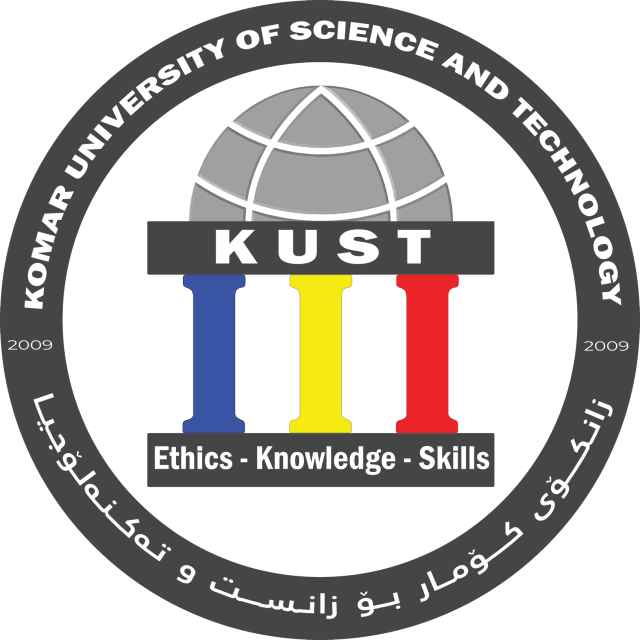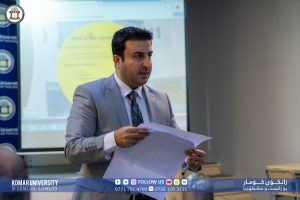Mission
General Objectives
Director Message
|
1. Student Learning Outcomes: Assessing Students’ Knowledge and ability to do.
2. Teaching Performance: Effectiveness of the instructor in transferring “knowledge and ability to do to students”.
3. Services: Services given to students by the University/College/Department outside the classrooms.
For each task, OQAA will apply different criteria for assessing them effectively. We believe that matching our criteria with international accreditation program such ABET for engineering programs will lead us towards offering a better education to our students and later will reflect in student learning outcome. Our students will be well prepared after graduation for national and international test. The culture of appreciating the importance of adapting international accreditation among KUST faculty, staff and faculty will be promoted by OQAA. In addition to international accreditation, OQAA believes that working according to MHESR Quality Assurance policy will elevate the level of education at our University.
MHESR Quality Assurance Message:
As quoted from the Ministry of Higher Education and Scientific Research (MHESR), the message ensures that is:
‘’ The message of our quality assurance program is to assure students of the academic standards offered within the universities and institutes of the Kurdistan Region. The purpose of the TQA program is to create an environment in which members of society believe in the education, learning, and research processes of the higher education system in the Kurdistan Region. Helping the Higher Education system in Kurdistan to attain a high standard and developing them in away so that they reach the standards of excellence for which international universities are renowned will bring renewed hope and confidence in the universities and institutes of the Kurdistan Region. Graduates will be proud to graduate with degrees from regional universities and institutes because they know that they have achieved the same quality as competitive universities elsewhere in the world. Despite the efforts and the dedication of the administration, academics and students, the Ministry of Higher Education requires everyone to pursue their academic goals and fulfill their requirements without allowing personal interests to interfere.’’
Twana A. Tahir
Director of OQAA
|
Operating Principles
|
The Office of Quality Assurance and Accreditation (OQAA) is working under some principles which framework it activities and plans:
Principle 1: “Holistic” approach. All aspects of the institution’s activities, academic, administrative and managerial will be subject to audit and reporting.
Principle 2: The institution will be judged according to its own objectives “Trust but verify” that is, on whether or not it is achieving its own mission in a purposeful and clear fashion.
Principle 3: “Improvement focus”. KUST Quality Assurance will have a focus on assisting and facilitating improvement within KUST. It sees audits as a value tool to assist KUST to enhance quality education. OQAA is a partnership, “cemented with a common will to improve”.
Principle 4: “Planning framework”. The quality assurance model adopted presupposes a planning and evaluation framework to quality systems. Objectives must be planned, actions taken must be measurable in verifiable ways, reviews of the plans and measures be undertaken. Surveys particularly of employers and students are seen as crucial instruments for continuous improvement. The set objectives must be “SMART”, i.e. Specific, Measurable, Achievable, Realistic and Time-bound.
Principle 5: Data and resources. Whatever resources are needed by the OQAA should already be required by the institutions’ own internal quality systems and process. The OQAA‘s self-assessment approach builds assessments around what already happens or should be happening. In brief, the QAO’s operational catchwords are “accountability” and “improvement” through “self-assessment” against objectives” achieved by good “planning” and “processes”, but “measured” and periodically “reviewed.”
Principle 6: Quality teaching, learning, research and support services or auxiliary services, continuous improvement as a core value. Quality teaching, learning, research are essential to KUST’s mission, goals and activities. The University’s quality assurance processes are intrinsic to the work of all staff, who are undertaking or supporting teaching and the promotion of learning and research.
Principle 7: Benchmarking and evidence-based approach The University evaluates its achievements against appropriate national and international benchmarks. Its quality assurance methods are evidence-based, where outcomes and feedback from stakeholders (including students, staff, employers and the community) will provide the basis for analyses and conclusions on which improvements are planned. Principle 8: Collegiality and Team spirit ,The University’s procedures reflect the principles of rigorous peer review, such as identify areas for improvement, foster collaboration, and team spirit, exchange of best practice, and encourage critical self-evaluation.
Principle 9: Audit Processes by the external authorized party will be conducted annually. Members of audit teams will be independent of the institution they are auditing and will be trained in auditing techniques. To assist both auditors and institutions, audit guidelines will be developed collaboratively by the KUST Quality Assurance Unit.
|

 Office of Quality Assurance and Accreditation (OQAA) at Komar University of Science and Technology is continuously working on how to enhance the quality of education with accordance to international standard accreditation and Quality Assurance department from Ministry of Higher Education and Scientific Research (MHESR).The University recognizes that attention to quality must be structured and systematic, therefore QA is mainly focusing on three different areas to be evaluated:
Office of Quality Assurance and Accreditation (OQAA) at Komar University of Science and Technology is continuously working on how to enhance the quality of education with accordance to international standard accreditation and Quality Assurance department from Ministry of Higher Education and Scientific Research (MHESR).The University recognizes that attention to quality must be structured and systematic, therefore QA is mainly focusing on three different areas to be evaluated:
